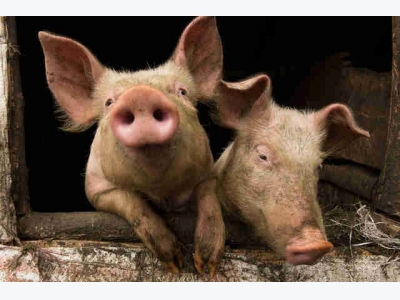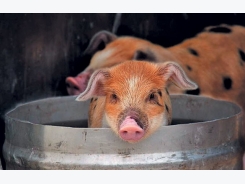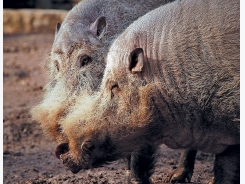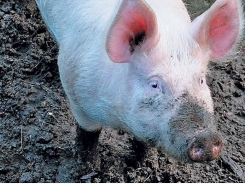Scientists want to make liquid manure smell a bit better

Ammonia causes the disgusting smell of urine in liquid manure from pigs and cattle. Scientists are not far from finding a way of stopping the formation of ammonia, although, this will not entirely remove the smell.
Denmark produces many millions of pigs for slaughter every year. If scientists can succeed in preventing the formation of ammonia in the pig manure, considerable environmental problems can be solved. (Photo: Shutterstock)
As you drive through the countryside after the liquid manure as been spread, the disgusting smell quickly seems to penetrate even the most tightly closed car windows.
It is ammonia in the liquid manure that gives it the pungent smell of urine. Now Danish scientists are working stop the formation of ammonia.
Ammonia forms because of the presence of urease, an enzyme found in the excrement of cattle and pigs. When excrements and urine are mixed and form liquid manure, bacteria in the excrement convert the urea into ammonia.
"The smell of ammonia in liquid manure is the same one that meets your nose from a urinal, so there’s no doubt it’s largely responsible for the disgusting smell. However, liquid manure also includes sulphides, which is the source of smell when people break wind. So entirely removing the disgusting smell from manure is quite a complex affair," says Henrik Karring, assistant Professor at the Department of Chemical, Biological and Environmental Technology at the University of Southern Denmark.
Ammonia from manure harms the environment
Ammonia is a compound of nitrogen and hydrogen, and nitrogen is used as a fertiliser in agriculture. Agricultural crops require a lot of fertiliser, but other plants in the natural environment require a lot less external nutrition.
Therefore, when the ammonia used in agriculture evaporates, some of it ends up in the countryside. Here it becomes a compound that is harmful for the environment.
A new study shows that manure from pigs forms ammonia far more quickly than liquid manure from cattle.
When the scientists measured the formation of ammonia immediately following the mixing of urine and excrement from pigs and cattle, they discovered that in one minute 1.5 mmol of ammonia formed in 1 litre of pig liquid manure, while the equivalent figure for liquid manure from cattle was approximately 0.3 mmol.
"We were very surprised to find there was such a huge difference. This is either due to there being more bacteria in the excrement of pigs or because it contains more of the enzyme urease. We produce a lot of pigs in Denmark, so it's extremely important to reduce the amount of ammonia in manure. Therefore, we are now trying to find out how we can deactivate the enzyme to reduce the production of ammonia," says Karring.
Scientist: It’s tricky
Søren O. Petersen, senior researcher at the Department of Agroecology at Aarhus University, welcomes the new study.
"The study appears to be well done. The parameters for cattle and pig liquid manure can undoubtedly improve models for ammonia reduction,” he says.
On the other hand, he does not see the immediately potential in regards to reducing the evaporation of ammonia.
“It is too early to know how these results could help reduce ammonia pollution. However, if you in some way succeed in stopping urease activity in faeces, then you might be able to delay the process of ammonia production,” he says, but continues:
“At the same time it is important that the liquid manure does not loose its fertilisation abilities, so that the crop is affected”.
Translated by Hugh Matthews
Related news
Tools

Phối trộn thức ăn chăn nuôi

Pha dung dịch thủy canh

Định mức cho tôm ăn

Phối trộn phân bón NPK

Xác định tỷ lệ tôm sống

Chuyển đổi đơn vị phân bón

Xác định công suất sục khí

Chuyển đổi đơn vị tôm

Tính diện tích nhà kính

Tính thể tích ao




 Making good sperm better
Making good sperm better  Understanding the role of the boar in breeding
Understanding the role of the boar in breeding